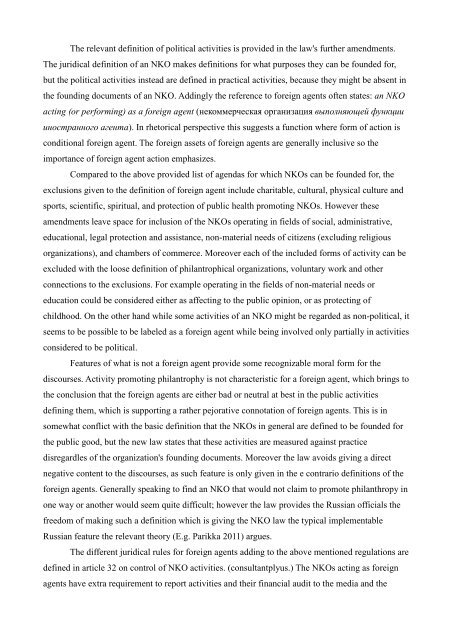Foreign Agents in Russia - Doria
Foreign Agents in Russia - Doria
Foreign Agents in Russia - Doria
Create successful ePaper yourself
Turn your PDF publications into a flip-book with our unique Google optimized e-Paper software.
39<br />
The relevant def<strong>in</strong>ition of political activities is provided <strong>in</strong> the law's further amendments.<br />
The juridical def<strong>in</strong>ition of an NKO makes def<strong>in</strong>itions for what purposes they can be founded for,<br />
but the political activities <strong>in</strong>stead are def<strong>in</strong>ed <strong>in</strong> practical activities, because they might be absent <strong>in</strong><br />
the found<strong>in</strong>g documents of an NKO. Add<strong>in</strong>gly the reference to foreign agents often states: an NKO<br />
act<strong>in</strong>g (or perform<strong>in</strong>g) as a foreign agent (некоммерческая организация выполняющей функции<br />
иностранного агента). In rhetorical perspective this suggests a function where form of action is<br />
conditional foreign agent. The foreign assets of foreign agents are generally <strong>in</strong>clusive so the<br />
importance of foreign agent action emphasizes.<br />
Compared to the above provided list of agendas for which NKOs can be founded for, the<br />
exclusions given to the def<strong>in</strong>ition of foreign agent <strong>in</strong>clude charitable, cultural, physical culture and<br />
sports, scientific, spiritual, and protection of public health promot<strong>in</strong>g NKOs. However these<br />
amendments leave space for <strong>in</strong>clusion of the NKOs operat<strong>in</strong>g <strong>in</strong> fields of social, adm<strong>in</strong>istrative,<br />
educational, legal protection and assistance, non-material needs of citizens (exclud<strong>in</strong>g religious<br />
organizations), and chambers of commerce. Moreover each of the <strong>in</strong>cluded forms of activity can be<br />
excluded with the loose def<strong>in</strong>ition of philantrophical organizations, voluntary work and other<br />
connections to the exclusions. For example operat<strong>in</strong>g <strong>in</strong> the fields of non-material needs or<br />
education could be considered either as affect<strong>in</strong>g to the public op<strong>in</strong>ion, or as protect<strong>in</strong>g of<br />
childhood. On the other hand while some activities of an NKO might be regarded as non-political, it<br />
seems to be possible to be labeled as a foreign agent while be<strong>in</strong>g <strong>in</strong>volved only partially <strong>in</strong> activities<br />
considered to be political.<br />
Features of what is not a foreign agent provide some recognizable moral form for the<br />
discourses. Activity promot<strong>in</strong>g philantrophy is not characteristic for a foreign agent, which br<strong>in</strong>gs to<br />
the conclusion that the foreign agents are either bad or neutral at best <strong>in</strong> the public activities<br />
def<strong>in</strong><strong>in</strong>g them, which is support<strong>in</strong>g a rather pejorative connotation of foreign agents. This is <strong>in</strong><br />
somewhat conflict with the basic def<strong>in</strong>ition that the NKOs <strong>in</strong> general are def<strong>in</strong>ed to be founded for<br />
the public good, but the new law states that these activities are measured aga<strong>in</strong>st practice<br />
disregardles of the organization's found<strong>in</strong>g documents. Moreover the law avoids giv<strong>in</strong>g a direct<br />
negative content to the discourses, as such feature is only given <strong>in</strong> the e contrario def<strong>in</strong>itions of the<br />
foreign agents. Generally speak<strong>in</strong>g to f<strong>in</strong>d an NKO that would not claim to promote philanthropy <strong>in</strong><br />
one way or another would seem quite difficult; however the law provides the <strong>Russia</strong>n officials the<br />
freedom of mak<strong>in</strong>g such a def<strong>in</strong>ition which is giv<strong>in</strong>g the NKO law the typical implementable<br />
<strong>Russia</strong>n feature the relevant theory (E.g. Parikka 2011) argues.<br />
The different juridical rules for foreign agents add<strong>in</strong>g to the above mentioned regulations are<br />
def<strong>in</strong>ed <strong>in</strong> article 32 on control of NKO activities. (consultantplyus.) The NKOs act<strong>in</strong>g as foreign<br />
agents have extra requirement to report activities and their f<strong>in</strong>ancial audit to the media and the
















